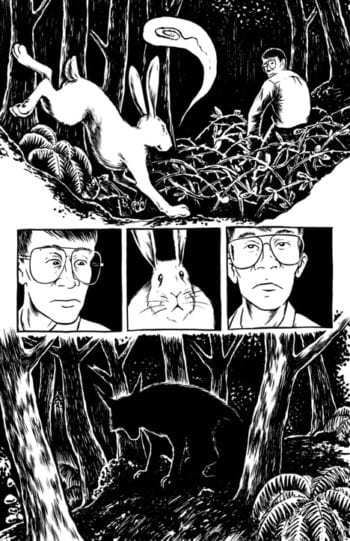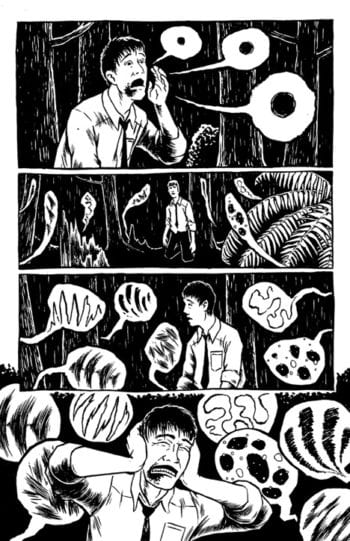It’s a jungle out there --- or, in the case of Reid Psaltis’ new Secret Acres-published wordless graphic novel, Kingdom/Order, a forest. We’re pretty well insulated from the realities, both harsh and beautiful, of the natural world thanks to the advanced state of human techno-society. Just a couple generations back, for instance, most people grew or slaughtered their own food, but now that we’ve got Ronald McDonald and the Jolly Green Giant to do the dirty work for us, we can safely retreat within workplace cubicles and homes/apartments, secure in the knowledge that, barring personal or societal economic catastrophe, our basic needs can be provided for without us having to get too directly involved in the process.
And yet, the idea that “something has been lost” as we’ve divorced ourselves from the forests, the fields, and their animal inhabitants is so widespread as to be positively ubiquitous at this point. Just about everyone you meet wishes they had more time to spend in the outdoors, and it seems pretty well obvious that many of us keep pets in order to maintain some sort of “connection,” however tepid and de-fanged, with the animal kingdom. The desire to understand our four-legged friends is as widespread as it is enduring --- so what would happen if, one day, we actually could?
 Such is the plight/opportunity presented to Psaltis’ nameless protagonist, a dime-a-dozen office functionary who suddenly realizes that he can understand, and answer, the various and sundry calls of pretty much any and every animal. Gifted or cursed with such an ability one would immediately have not just an entirely new outlook on life, but several of them, so it comes as no surprise when our “Average Joe” ends up following his newly-honed instincts and, in fairly short order, not so much consciously abandoning his coddled city life, but going where a combination of events and his senses take him. Indeed, Kingdom/Order more “flows” than it can actually be said to “progress,” despite the narrative being segmented into three distinct acts that can roughly be summed up as “fear,” “acceptance,” and “subjugation,” in accordance with our man’s relationship to the natural world in each part of the story.
Such is the plight/opportunity presented to Psaltis’ nameless protagonist, a dime-a-dozen office functionary who suddenly realizes that he can understand, and answer, the various and sundry calls of pretty much any and every animal. Gifted or cursed with such an ability one would immediately have not just an entirely new outlook on life, but several of them, so it comes as no surprise when our “Average Joe” ends up following his newly-honed instincts and, in fairly short order, not so much consciously abandoning his coddled city life, but going where a combination of events and his senses take him. Indeed, Kingdom/Order more “flows” than it can actually be said to “progress,” despite the narrative being segmented into three distinct acts that can roughly be summed up as “fear,” “acceptance,” and “subjugation,” in accordance with our man’s relationship to the natural world in each part of the story.
Eric Drooker’s groundbreaking Flood comes to mind throughout this book, not only because both are entirely “silent” works, but because Psaltis often veers into Drooker-esque woodcut-style illustration, yet the focus here is tighter, although arguably no less ambitious. One could even argue that the plethora of socio-economic problems Drooker touches upon in his book all stem from the separation of man from the natural world that Psaltis explores in the pages of his. Indeed, I’m sure someone of the “Green Anarchist” political persuasion would say precisely that, and Psaltis’ thick, expressive, detailed line manages to convey a lot of the universality he’s aiming to imbue his story with. When his protagonist is curious at the outset, it shows in every facial expression, every “tic” of his body language, and the same holds true when his feelings “evolve” into fear, complacency, happiness, and finally into aggression. You know right where our man is every step of the way here, emotionally as well as physically, and that’s all down to the power and precision of Psaltis’ rich, nuanced illustration.
 Like the animal world it’s acting as interpreter for, though, Kingdom/Order does have its flaws. Psaltis starts out with some very inventive visual “verbiage” in terms of the various calls of the wild he employs, but as he introduces more and more creatures into the mix, he runs out of interesting ways with which to depict their “speech”; our man’s sudden turn toward dreams of conquest is immediate to the point of being borderline-jarring. Subtlety is something Psaltis doesn’t particularly try for as his protagonist is clearly meant as a stand-in for humankind en masse from the outset.
Like the animal world it’s acting as interpreter for, though, Kingdom/Order does have its flaws. Psaltis starts out with some very inventive visual “verbiage” in terms of the various calls of the wild he employs, but as he introduces more and more creatures into the mix, he runs out of interesting ways with which to depict their “speech”; our man’s sudden turn toward dreams of conquest is immediate to the point of being borderline-jarring. Subtlety is something Psaltis doesn’t particularly try for as his protagonist is clearly meant as a stand-in for humankind en masse from the outset.
All that being said, visual polemics don’t come much more arresting or fascinating than this one, and Psaltis’ cartooning skills are strong. He goes into Kingdom/Order with a very clear message of what he wants to convey, and furthermore with a very clear idea of how he wants to do so, and at the risk of engaging in painfully obvious wordplay, he succeeds wildly at both. By the time you reach the end, you’ll be wondering why the hell we ever came down from the trees.







